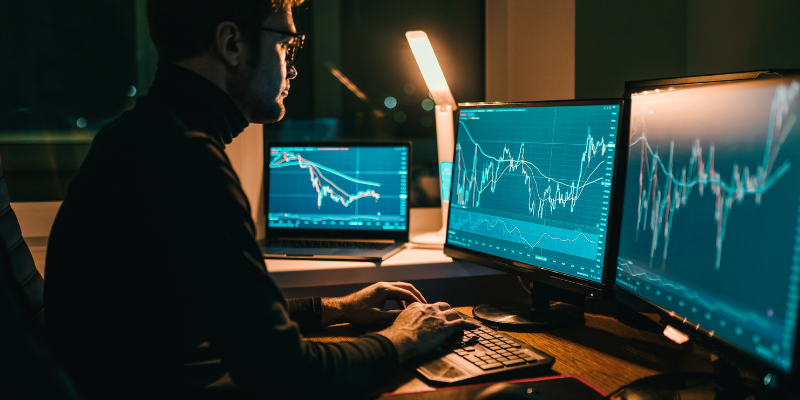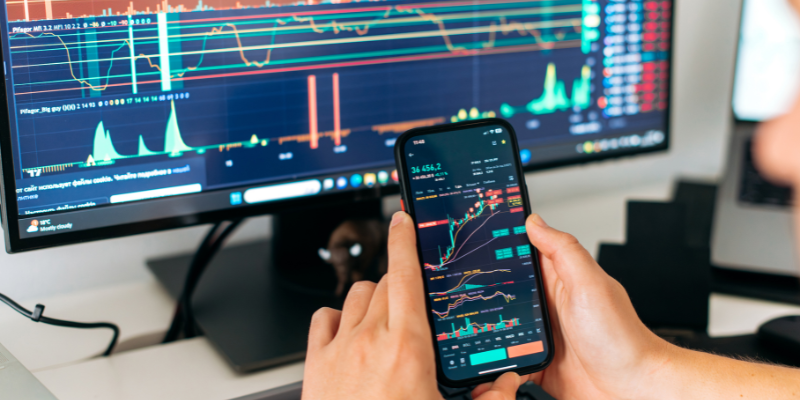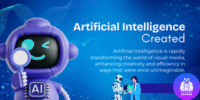Artificial Intelligence for Trading Your Guide to a Smarter Trading Future
Published: April 21, 2025

Artificial Intelligence for Trading Developments in AI technology are bound to have some impacts on the finance sector. The finance sector issues involve copious data, which must be organized and represented comprehensively. The capacity of AI to filter through information is immense. Information online is vast and includes data on stocks, bonds, commodities, specific trends, and patterns prevailing in society at a given time and anticipated. AI is crucial for traders to support their decisions. The strategies for inexperienced and adept traders evolve alongside technology; thus, understanding the function AI serves at various levels can be determined. Trading is changing how we approach the trading system, improvement methods, and profit maximization.
This article will review the interesting area of artificial intelligence for trading. We will cover everything from understanding AI tools to the best-suited AI trading software and platform for your needs. You will also understand how AI predictions are changing market trading strategies and how to formulate a good trading strategy with AI. We will also examine various AI-based trading tools, such as robots, AI stock trading programs, and the new quantum computers revolutionizing the market.
This article aims to equip you with a comprehensive understanding of artificial intelligence for trading and provide valuable pointers and information on taking action. For those wanting to exploit AI in their trading endeavors, we’ll discuss here what steps to take to make AI work for you.
Table of Contents
- What is Artificial Intelligence for Trading:
- Types of Artificial Intelligence in Trading
- AI Trading Bots
- AI Stock Trading Software
- Quantum Machine Learning in Trading
- Choosing the Right Artificial Intelligence Trading Platform
- How Artificial Intelligence Predictions Are Shaping Trading
- Developing an AI-Based Trading Strategy
- Key Benefits of Artificial Intelligence for Trading
- Real-World Examples of Artificial Intelligence in Trading
- Ethical Considerations and Artificial Intelligence Policy
- Conclusion
1. What is Artificial Intelligence forTrading:
Artificial Intelligence for Trading uses machine learning, algorithmic and heuristic trading, deep learning, data mining, and other techniques to evaluate market data and anticipate its future progress in using AI in trading. AI systems for trading assess vast quantities of trading data that are impossibly large for humans to process in mere seconds and assist a trader instantaneously in decisions he has to make. AI identifies market changes and irregularities and predicts outcomes with remarkable accuracy compared to traditional methodologies.
Market participants use artificial intelligence AI in trading to remove the emotional biases that come with human decision-making. Implementing AI technology provides new business insights by processing comprehensive data sets, leading to swift decision-making and improved management while lessening human blunders. Many kinds of AI exist, from trading bots that can execute commands automatically to sophisticated stock traders’ software that analyzes the market and predicts its movements in real time.
Artificial Intelligence for Trading Knowing how to capitalize on AI tools and amalgamate them with the firm’s trade policies is vital for an entity wishing to remain relevant and compete head-to-head with industry professionals.
2. Types of Artificial Intelligence in Trading

Artificial Intelligence for Trading In today’s world of technology, there is no shortage of artificial intelligence-powered tools for AI. Learning to operate such tools and any modifications needed to make them more personal to one’s trading style is vital for improving success rates in traders’ marketplaces.
Here are the most commonly utilized forms that formulate artificial intelligence in trading:
AI Trading Bots
Artificial Intelligence for Trading AI trading bots are programs that will automatically execute trades for you based on a specific set of conditions. Through the use of AI, they learn from data on the market and improve their trading systems over time. They are most often used in high-frequency trading environments where there is a need for instantaneous decision-making.
Benefits of AI Trading Bots:
- Automated trading at any time of the day
- Enhanced speeds of executing trades
- Improper decision-making is negligible.
- Emotionally driven trading is significantly reduced.
Cryptohopper and Commas are the most renowned AI trading bots. They all enable traders to devise unique strategies and offer integration into various trading systems.
AI Stock Trading Programs
Artificial Intelligence for Trading AI stock trading software uses machine learning and advanced algorithms to analyze the stock market and attempt to predict future price movements. Unlike traditional systems, AI stock trading systems adapt to market fluctuations and perform better by “learning” from real-time and historical data.
Benefits of AI Stock Trading Software:
- Increased forecast accuracy
- Ability to respond to changes in market conditions
- Automatically pinpoint lucrative prospects through a data-driven analysis.
Some of the most cited examples of AI trading software are Trade Station and Meta Trader. These platforms utilize machine learning to help traders anticipate price fluctuations while making trading decisions.
Quantum Machine Learning in Trading
Artificial Intelligence for Trading Quantum machine learning is an unprecedented blend of quantum computing and algorithmic machine learning. Designed to solve complex problems that conventional computers struggle with, quantum computers can simultaneously process vast amounts of market data. These capabilities can revolutionize trading by improving prediction accuracy, data analysis speed, trading strategy enhancement, and overall trading techniques.
Benefits of Quantum Machine Learning:
- Swiftly analyze massive volumes of financial data.
- Future forecasting capabilities can be improved.
- Ability to execute complex trading strategies.
Companies like IBM and Google have begun exploring the application of quantum computing in the financial industry, although it remains in the early stage.
3. Choosing the Right Artificial Intelligence Trading Platform
Artificial Intelligence for Trading Selecting the most suitable AI trading system requires considering various factors relating to personal preferences and the trading style adopted. The most important are shown below.
- Intuitive Design: Select a platform with an easy-to-understand design.
- Customization: A custom-made approach to developing strategies is critical.
- Data Integration: The platform must be able to integrate multiple data sources to enhance forecasting accuracy.
- Technical Challenges Support: Would you confirm that the site provides sufficient support for technical challenges
Examples of widely known AI trading platforms include Interactive Brokers, eToro, and Trade Station. These firms provide their clients with AI trading applications embedded with real-time analytics, which enhances their decision-making processes while trading.
4. How Artificial Intelligence Predictions Are Shaping Trading
Artificial Intelligence for Trading ‘ AI-based predictions have affected traders’ perceptions and interactions with the market because AI technologies can forecast market trends, capture price fluctuations, and enable timely responses. With the help of historical information and actual developments, AI systems can provide insights that assist traders in strategically maximizing their profits while minimizing risks.
AI systems, for example, can estimate the probabilities of a stock hitting a resistance point or a particular stock market undergoing a bullish or bearish trend. When harnessed, this data gives traders an informational advantage that helps them respond more quickly and accurately than earlier methodologies.
Artificial Intelligence for Trading In cryptocurrency, AI predictions have had thrusting impacts in regions where extreme price increases and decreases are common. In these situations, AI-enabled platforms like Coinrule, which allow users to trade automatically, utilize AI to predict market actions.
5. Developing an AI-Based Trading Strategy

Artificial Intelligence for Trading The following steps will ensure AI integration into the trading strategies that you practice is seamless:
- Assess your trading objectives: Find out whether your attention is on short-term trades, long-term investments, or if you prefer day trading. The benchmarks you have established will dictate the AI solutions to utilize.
- Pick your preferred AI tool: Choose an AI tool that corresponds to your trading style. A day trader, for instance, could benefit from an AI trading robot, while AI stock trading software would be more appropriate for long-term stock investment.
- Backtesting Strategies: Before going live with a method, use historical data to assess its efficacy.
Evaluation and iteration: Constantly check your AI system’s performance and make any needed changes to improve the metrics.
6. Key Benefits of Artificial Intelligence for Trading

Artificial Intelligence for Trading Performance accuracy, optimal speed, and efficiency are just a few of the many benefits AI technology offers in trading.
- Precision Accuracy: AI systems’ ability to analyze endless amounts of data over time involves identifying emerging trends, significantly boosting accuracy.
- Speed: The ability to execute trades as soon as they are analyzed ensures the tools take advantage of profitable prospects immediately.
- Live Trading: AI trading bots and platforms work 24/7 without breaks to minimize the missing opportunity.
- Data-driven decisions: AI filters out emotional conflicts within humans and drives decisions completely through data.
7. Real-World Examples of Artificial Intelligence in Trading
Artificial Intelligence for Trading The hedge fund Two Sigma Investments implements AI algorithms to analyze and forecast market data, subsequently achieving market expectations and impressive returns.
Betterment: A robo-advisor powered by AI that automatically assists clients with portfolio management by employing algorithmic trading strategies tailored to the individual’s risk appetite.
8. Ethical Considerations and Artificial Intelligence Policy
Artificial Intelligence for Trading Like any powerful technology, using AI for trading raises critical ethical issues that must be critically examined. At times, AI systems may operate in unexpected ways. Moreover, issues of transparency, bias, and accountability are serious concerns. Frameworks for artificial intelligence policy and regulation are paramount to guarantee that AI systems are adequately employed and just.
Cognizance of these matters becomes pertinent with traders’ application of AI and the regulations, laws, and ethical aspects they must follow. Furthermore, close oversight of these AI systems is required so they do not damage the market or any of its participants.
Conclusion:
Artificial Intelligence for Trading the sector will continue to be profoundly affected by the development of artificial intelligence. Every facet of trading, whether through AI trading bots, stock trading software, or even quantum machine learning, will see heightened efficiency, accuracy, and profits due to AI.
To reap the full benefits of AI in trading, begin integrating AI-powered platforms and tools now.
FAQs
1- What does ‘Artificial Intelligence (AI) ‘mean about trading?
With its algorithms and machine learning, AI incorporates a new level of sophistication into trading. Data is scrutinized, models are generated, and trades are streamlined.
2. What is an AI trading bot, and what does it do?
An AI trading bot is engineered to independently follow and interpret market information and execute live trades within predetermined rules and frameworks without human intervention.
3. What are the primary advantages of AI in trading?
AI enhances the speed at which trading and decisions are made. It also significantly reduces emotional biases that come into play during trading. Potential and profitable opportunities are swiftly identified.
4. What is the most precise AI trading software?
The most efficient AI trading software should be judged on its ease of navigation and personalization, integration of relevant data, and outstanding customer service.
5. Do AI predictions truly enhance the precision of trading?
AI algorithms assess massive volumes of data, which optimally equips traders to detect patterns, foresee changes, and make better decisions.

- Be Respectful
- Stay Relevant
- Stay Positive
- True Feedback
- Encourage Discussion
- Avoid Spamming
- No Fake News
- Don't Copy-Paste
- No Personal Attacks



- Be Respectful
- Stay Relevant
- Stay Positive
- True Feedback
- Encourage Discussion
- Avoid Spamming
- No Fake News
- Don't Copy-Paste
- No Personal Attacks





